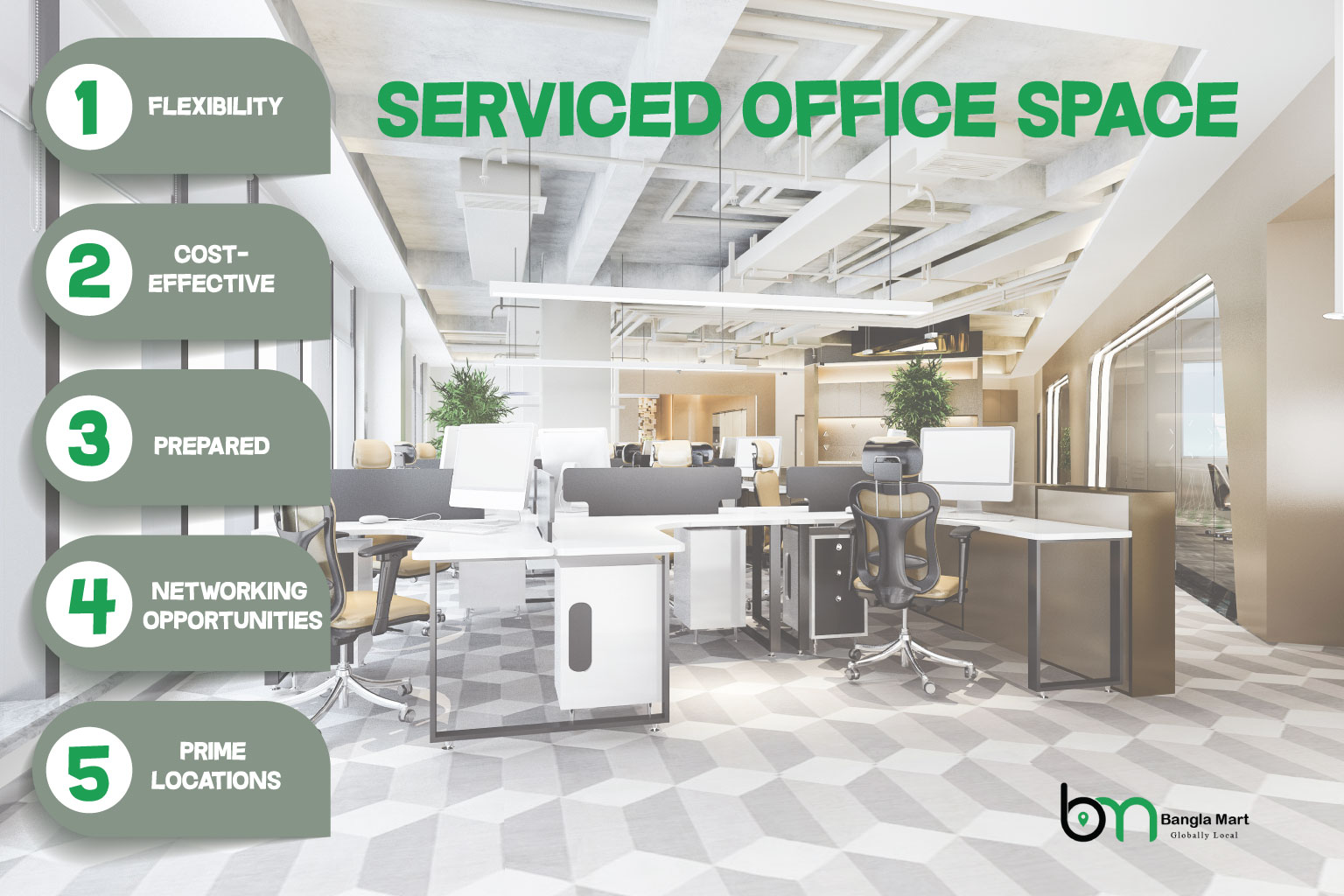Startups are increasingly gravitating towards serviced office spaces due to their inherent flexibility and convenience. Many startups operate under uncertain growth trajectories, making the short-term leases and scalability of serviced offices highly appealing.
Additionally, these spaces typically come fully equipped with essential amenities, from high-speed internet to conference rooms, eliminating the need for significant upfront investment in infrastructure.
Furthermore, the all-inclusive pricing model of serviced offices often proves cost-effective, removing the burden of managing multiple bills. The collaborative environment of serviced office space allows startups to connect with like-minded entrepreneurs and potential partners.
Lastly, in a world where first impressions matter, having a professional setting can enhance a startup’s image, especially when meeting investors or clients. Serviced office spaces provide a blend of functionality, and financial viability perfectly suited for the dynamic needs of startups.
In 2023, there will be around 2.6 million individuals working in serviced office spaces throughout the world.
How Serviced Office Spaces Boost Employee Collaboration?
Serviced office spaces are meticulously designed to enhance employee collaboration and foster a productive work environment. Their open layouts and shared workspaces promote spontaneous interactions and cross-team communication.
The availability of shared amenities, such as lounges, coffee areas, and break rooms, provides informal settings where employees can engage in casual conversations, leading to the exchange of ideas and knowledge.
Additionally, fully equipped meeting and conference rooms facilitate structured team discussions without the hassle of external bookings or setups. The communal nature of these spaces also brings together professionals from diverse industries and backgrounds, encouraging interdisciplinary networking and collaboration.
5 Benefits of Serviced Office Space
Certainly! Here are five key benefits of serviced office spaces:
- Flexibility:
One of the main draws of serviced office spaces is the flexibility they offer. Companies can scale up or down depending on their current needs without the long-term commitment of traditional leases.
- Cost-Effective:
Serviced offices typically come with an all-inclusive pricing model. This means businesses don’t have to worry about additional costs like utilities, maintenance, or even sometimes internet and receptionist services.
- Ready-to-Use Infrastructure:
These offices are fully equipped and furnished, ready for immediate use. Businesses can avoid the downtime associated with setting up a new space, ensuring that operations continue seamlessly.
- Networking Opportunities:
Sharing a space with various professionals and businesses provides a unique opportunity for networking. The communal environment allows for regular interactions with individuals from diverse industries, client leads, or even new business ideas.
- Prime Locations:
Many serviced office spaces are situated in prime business districts or popular urban areas. This not only gives businesses a prestigious address but also ensures easy accessibility for clients and employees alike.
Is a Serviced Office Space Right for Your Growing Business?
Determining if a serviced office space is right for your growing business hinges on several factors. Serviced offices are perfect for businesses seeking flexibility, as they typically offer shorter lease terms, allowing for easy expansion or downsizing based on evolving needs.
Moreover, the immediate availability of essential infrastructure, from internet connectivity to meeting rooms, eliminates setup delays, ensuring continuous operational efficiency.
The all-inclusive nature of these spaces ensures that businesses don’t get bogged down by administrative tasks, such as utility management, and can focus solely on growth.
However, over the long term, the cumulative cost may exceed that of traditional leases. Being situated in prime locations, these offices can also bolster a company’s image.
Thus, while serviced office spaces offer unparalleled convenience and flexibility, businesses should assess their long-term growth trajectory and financial strategy before making a decision.
The worldwide serviced office space market will increase by 18.6% CAGR from $33.3 billion in 2022 to $39.49 billion in 2023.
Why You Need to Select Serviced Office Space Over Traditional Office Space?
Opting for a serviced office space over a traditional one provides businesses with unparalleled flexibility and convenience. Serviced offices come with shorter lease terms, allowing companies to adapt to growth or downsizing without the constraints of long-term commitments.
They’re move-in ready, eliminating the need for hefty initial investments in furnishings, equipment, and IT infrastructure. Monthly fees often encompass utilities, maintenance, and other services, simplifying financial planning.
Moreover, their prime locations bolster a company’s professional image, while shared amenities and communal areas foster networking. Serviced offices present a hassle-free, and cost-effective solution, especially beneficial for startups, SMEs, or businesses in dynamic sectors.
Which Type of Business Uses Serviced Office Space: In Percentages,
While the precise percentages can vary based on location, economic conditions, and other factors, many types of businesses utilize serviced office spaces. Here’s a hypothetical table illustrating the distribution of businesses by type that might use serviced office spaces:
| Type of Business | Percentage (%) |
| Startups | 35% |
| Freelancers & Consultants | 15% |
| Small to Medium Enterprises (SMEs) | 25% |
| Large Corporations (for satellite offices) | 10% |
| Non-profit Organizations | 5% |
| International Companies (setting up new branches) | 7% |
| Others (like training centers, temporary project teams) | 3% |

How Serviced Office Space Can Help Your Employees Perform Better?
Serviced office spaces, with their modern design and all-inclusive amenities, can significantly enhance employee performance and productivity. The hassle-free environment, devoid of administrative distractions like utility management or maintenance, allows employees to focus entirely on their core tasks.
The ergonomic design and high-quality infrastructure, often characteristic of such spaces, provide a comfortable working environment that reduces fatigue.
Furthermore, the collaborative atmosphere promotes cross-functional interactions, sparking innovation and idea exchange. Access to state-of-the-art technology and meeting rooms ensures smooth operations and efficient communication.
Additionally, the prime locations of many serviced offices reduce commute times, while on-site amenities like cafes or lounges provide convenient relaxation spots, contributing to employee well-being and satisfaction.
The worldwide service office space market is estimated to increase with an annualized rate of 17.1% to $74.21 billion in 2027.
Does Serviced Office Space Provide Real Value for Money?
Serviced office spaces, when evaluated in terms of the amenities and conveniences they offer, can indeed provide real value for money, especially for specific types of businesses. They eliminate many upfront costs, such as those associated with furnishings, and leasehold improvements.
The all-inclusive pricing typically covers utilities, maintenance, security, and sometimes even receptionist services, reducing administrative burdens and hidden costs.
For businesses that value flexibility, such as startups and SMEs, the short-term lease agreements of serviced offices can be more cost-effective than long-term commercial leases, especially when considering potential scaling or downsizing.
Furthermore, the networking opportunities and prime locations these spaces often boast can provide intangible value that goes beyond mere monetary considerations.
While they might seem pricier on a month-to-month basis compared to traditional offices, the cumulative benefits and conveniences can make them a worthwhile investment for many.
5 Tips for Transitioning to a Serviced Office Space
Transitioning to a serviced office space can significantly streamline operations, but the move requires thoughtful planning. Here are the top 5 tips to ensure a smooth transition:
- Assess and Prioritize Needs
Before the move, list out essential requirements, such as the number of workstations, private meeting rooms, or any unique amenities. This will help in choosing a space that’s tailored to your business’s needs and reduces post-move adjustments.
- Choose the Right Location
The location of your serviced office should align with your business strategy. Consider factors like accessibility for clients, commute convenience for employees, proximity to business partners, and the prestige associated with certain business districts.
- Visit and Test the Space
Pictures can be deceiving. Always visit the potential spaces in person. This allows you to gauge the actual look and feel, test out facilities, and ensure the environment aligns with your company culture.
- Understand the Contract
Familiarize yourself with the lease terms. This includes the duration, monthly costs, included services, and any potential hidden charges. Knowing the flexibility the contract offers can be beneficial for future scaling or pivoting needs.
- Engage and Inform Your Team
A move affects all team members. Keep them informed about the transition timeline, the benefits of the new space, and any new protocols. Their comfort and buy-in are crucial for maintaining productivity during the transition.
Conclusion
Serviced office spaces have emerged as a preferred choice for many companies, from startups to established enterprises. These spaces offer unparalleled flexibility, allowing businesses to adapt to changing circumstances without the burden of long-term lease commitments.
With amenities that foster productivity, the convenience of prime locations, and the elimination of initial setup costs, they present a cost-effective solution for modern businesses.
The inclusive environment also promotes networking, collaboration, and a sense of community, enhancing not only work efficiency but also employee well-being.
FAQs
How does the cost of a serviced office compare to a traditional office?
While serviced office spaces might appear more expensive upfront, they often prove cost-effective when considering the inclusions like utilities, maintenance, furniture, and receptionist services. Traditional offices may require a longer lease and additional costs for setup and maintenance.
Can I scale my office space as my team grows?
Absolutely! One of the primary benefits of serviced office spaces is the ease with which companies can scale up or down. Many providers are equipped to accommodate the growth or reduction of your team.
How secure are serviced office spaces?
Most serviced office providers prioritize security, offering services like 24/7 security personnel, CCTV surveillance, and secure access systems. However, the level of security may vary between providers, so it’s a good idea to inquire beforehand.


